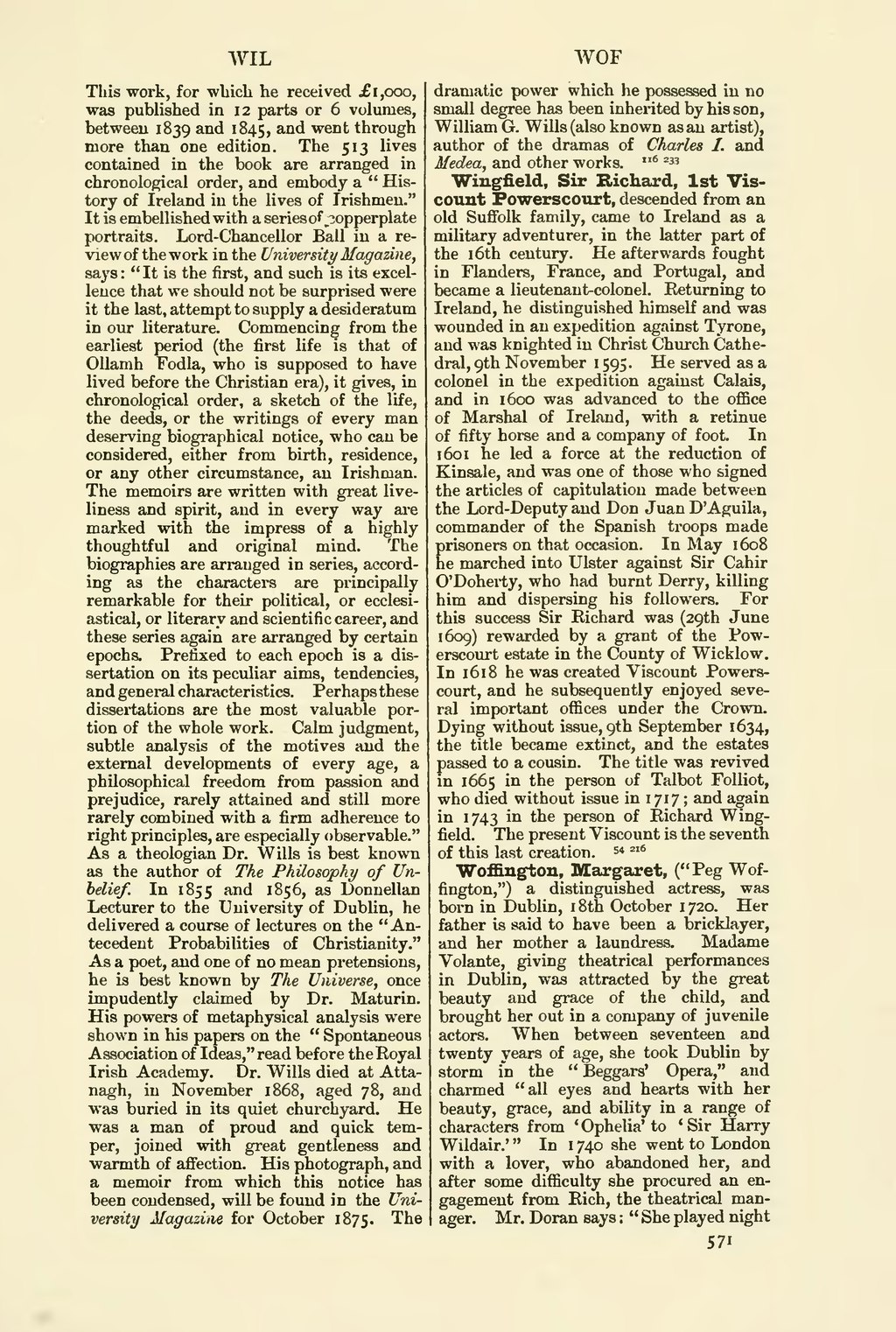This work, for which he received £1,000, was published in 12 parts or 6 volumes, between 1839 and 1845, and went through more than one edition. The 513 lives contained in the book are arranged in chronological order, and embody a "History of Ireland in the lives of Irishmen." It is embellished with a series of copperplate portraits. Lord-Chancellor Ball in a review of the work in the University Magazine, says: "It is the first, and such is its excellence that we should not be surprised were it the last, attempt to supply a desideratum in our literature. Commencing from the earliest period (the first life is that of Ollamh Fodia, who is supposed to have lived before the Christian era), it gives, in chronological order, a sketch of the life, the deeds, or the writings of every man deserving biographical notice, who can be considered, either from birth, residence, or any other circumstance, an Irishman. The memoirs are written with great liveliness and spirit, and in every way are marked with the impress of a highly thoughtful and original mind. The biographies are arranged in series, according as the characters are principally remarkable for their political, or ecclesiastical, or literary and scientific career, and these series again are arranged by certain epochs. Prefixed to each epoch is a dissertation on its peculiar aims, tendencies, and general characteristics. Perhaps these dissertations are the most valuable portion of the whole work. Calm judgment, subtle analysis of the motives and the external developments of every age, a philosophical freedom from passion and prejudice, rarely attained and still more rarely combined with a firm adherence to right principles, are especially observable." As a theologian Dr. Wills is best known as the author of The Philosophy of Unbelief. In 1855 and 1856, as Donnellan Lecturer to the University of Dublin, he delivered a course of lectures on the "Antecedent Probabilities of Christianity," As a poet, and one of no mean pretensions, he is best known by The Universe, once impudently claimed by Dr. Maturin. His powers of metaphysical analysis were shown in his papers on the "Spontaneous Association of Ideas," read before the Royal Irish Academy. Dr. Wills died at Attanagh, in November 1868, aged 78, and was buried in its quiet churchyard. He was a man of proud and quick temper, joined with great gentleness and warmth of affection. His photograph, and a memoir from which this notice has been condensed, will be found in the University Magazine for October 1875. The dramatic power which he possessed in no small degree has been inherited by his son, William G. Wills (also known as an artist), author of the dramas of Charles I. and Medea, and other works. 116 233
Wingfield, Sir Richard, 1st Viscount Powerscourt, descended from an old Suffolk family, came to Ireland as a military adventurer, in the latter part of the 16th century. He afterwards fought in Flanders, France, and Portugal, and became a lieutenant-colonel. Returning to Ireland, he distinguished himself and was wounded in an expedition against Tyrone, and was knighted in Christ Church Cathedral, 9th November 1595. He served as a colonel in the expedition against Calais, and in 1600 was advanced to the office of Marshal of Ireland, with a retinue of fifty horse and a company of foot. In 1601 he led a force at the reduction of Kinsale, and was one of those who signed the articles of capitulation made between the Lord-Deputy and Don Juan D'Aguila, commander of the Spanish troops made prisoners on that occasion. In May 1608 he marched into Ulster against Sir Cahir O'Doherty, who had burnt Derry, killing him and dispersing his followers. For this success Sir Richard was (29th June 1609) rewarded by a grant of the Powerscourt estate in the County of Wicklow, In 1618 he was created Viscount Powerscourt, and he subsequently enjoyed several important offices under the Crown. Dying without issue, 9th September 1634, the title became extinct, and the estates passed to a cousin. The title was revived in 1665 in the person of Talbot Folliot, who died without issue in 1717; and again in 1743 in the person of Richard Wingfield. The present Viscount is the seventh of this last creation. 54 216
Woffington, Margaret, ("Peg Woffington,") a distinguished actress, was born in Dublin, 18th October 1720. Her father is said to have been a bricklayer, and her mother a laundress. Madame Volante, giving theatrical performances in Dublin was attracted the great beauty and and grace of the child, and brought her out in a company of juvenile actors. When between seventeen and twenty years of age, she took Dublin by storm in the "Beggars' Opera," and charmed "all eyes and hearts with her beauty, grace, and ability in a range of characters from 'Ophelia' to 'Sir Harry Wildair.'" In 1740 she went to London with a lover, who abandoned her, and after some difficulty she procured an engagement from Rich, the theatrical manager. Mr. Doran says: "She played night
571
